
News
Behind the Headlines
Two-Cents Worth
Video of the Week
News Blurbs
Articles
Testimony
Bible Questions
Internet Articles (2015)
Internet Articles (2014)
Internet
Articles (2013)
Internet Articles (2012)
Internet Articles (2011)
Internet Articles (2010)
Internet Articles
(2009)
Internet Articles (2008)
Internet Articles (2007)
Internet Articles (2006)
Internet Articles (2005)
Internet Articles (2004)
Internet Articles (2003)
Internet Articles (2002)
Internet Articles (2001)

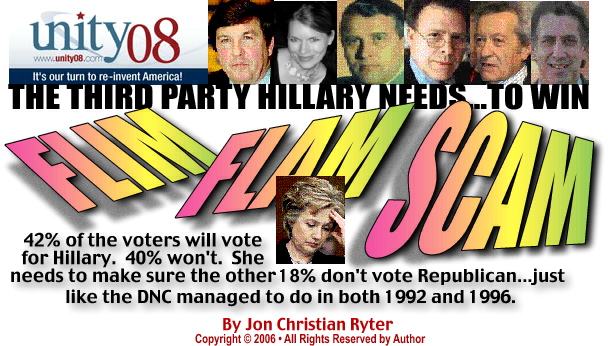
![]() n
1991 when Arkansas Governor Bill Clinton decided to challenge
President George H.W. Bush for the White House, all of
the honest in-house polls the Clinton Campaign and the
Democratic National Committee took indicated that Clinton
would lose to Bush by a margin of 16 points. The polls
taken by Bush and the Republican National Committee
said the same thing. Bush would win reelection by a margin
of at least 55% to 45%. The Clinton team knew they had
to shave 12% off Bush's vote if they were going to win.
They needed to find a third party spoiler.
n
1991 when Arkansas Governor Bill Clinton decided to challenge
President George H.W. Bush for the White House, all of
the honest in-house polls the Clinton Campaign and the
Democratic National Committee took indicated that Clinton
would lose to Bush by a margin of 16 points. The polls
taken by Bush and the Republican National Committee
said the same thing. Bush would win reelection by a margin
of at least 55% to 45%. The Clinton team knew they had
to shave 12% off Bush's vote if they were going to win.
They needed to find a third party spoiler. 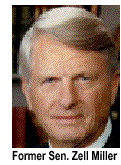 One
that could take enough votes from Bush to put Clinton
in the White House. Pat Buchanan couldn't do it, nor could
Dixiecrat Democrat Georgia Gov. Zell Miller, who was newly
elected in 1990. Miller, who backed GOP President George
W. Bush against Democratic Senator John Kerry in 2004,
did not become a conservative icon until that time. Running on
either ticket in 2008, there is not a candidate in either party
that could beat Miller. Miller, however, will not
run as a Republican—and the Democratic political machine
that will select the next Democratic presidential nominee is in
the hands of the Clintons. Zell Miller, a Democratic constitutionalist,
could not win the Democratic nomination but he could easily win
the election.
One
that could take enough votes from Bush to put Clinton
in the White House. Pat Buchanan couldn't do it, nor could
Dixiecrat Democrat Georgia Gov. Zell Miller, who was newly
elected in 1990. Miller, who backed GOP President George
W. Bush against Democratic Senator John Kerry in 2004,
did not become a conservative icon until that time. Running on
either ticket in 2008, there is not a candidate in either party
that could beat Miller. Miller, however, will not
run as a Republican—and the Democratic political machine
that will select the next Democratic presidential nominee is in
the hands of the Clintons. Zell Miller, a Democratic constitutionalist,
could not win the Democratic nomination but he could easily win
the election.
In 1992
the Clintons found the ideal third party candidate in H.
Ross Perot, the egotistical pint-sized Texas billionaire in
a ten gallon hat. Perot was the founder of Perot Systems.
Perot agreed to run interference for the Clintons
and act as the spoiler to drain votes from Bush-41.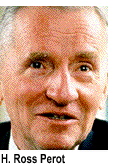 In exchange, Hillary Clinton promised him that two of his
companies would be given no-bid contracts for the lion's share
of Health Security Act data business—worth $8.5 billion.
(Evidence of the deal was found in the working papers of Hillary
Clinton's 1993 Health Care Task Force. Listed in the
Diebold Institute Commission report (found in the National
Archive, Health Security Act Working Papers, Diebold Report;
Box 1748) were the names of several influential people who
would ultimately play key, well-rewarded roles in promoting the
Clinton-agenda to the American people. Perot, a
director of the Diebold Institute, was one of them. His
participation in the election of 1992 was worth billions—if
Hillary's socialized medicine program was enacted.
In exchange, Hillary Clinton promised him that two of his
companies would be given no-bid contracts for the lion's share
of Health Security Act data business—worth $8.5 billion.
(Evidence of the deal was found in the working papers of Hillary
Clinton's 1993 Health Care Task Force. Listed in the
Diebold Institute Commission report (found in the National
Archive, Health Security Act Working Papers, Diebold Report;
Box 1748) were the names of several influential people who
would ultimately play key, well-rewarded roles in promoting the
Clinton-agenda to the American people. Perot, a
director of the Diebold Institute, was one of them. His
participation in the election of 1992 was worth billions—if
Hillary's socialized medicine program was enacted.
Others who would benefit from had Hillary's socialist medical scheme that would have bankrupted the US government by 1996, included Dr. P. Roy Vagelos, Chairman and CEO of Merck & Company; John D. McComber, Chairman, President & CEO of the Export-Import Bank of the United States and Maurice R. Greenberg, President and CEO of the American International Group; and of course, Perot. There were others named in the report, but these were the most important for the Clintons immediate objective—getting elected, enacting a national healthcare plan—and enacting NAFTA to pay the transnational industrialists back for placing them in the White House.
In October, 1996 the Washington Times broke a story that Clinton Chronicles author George Carposi had uncovered information that a deal had been cut in 1991 between Clinton and Perot for Perot to siphon off at least 12% of Bush's supporters—or at least throw the election into the House of Representatives, which was controlled by the Democrats in 1992.
Perot denied any personal deals with the Clintons. He also denied any association with the Diebold Group. When Carposi told him he was listed in the Diebold Report as one of the group's directors; and that his name showed up in the interdepartmental working group papers as a major recipient of Clinton largess if the Arkansas governor was elected, Perot feigned surprise, saying it was all news to him.
In 1992, Perot threw his tight-fitting Stetson into the ring, but hedging his bets by telling the media he would not run for president as an independent unless his "supporters" got him on the ballot in all 50 States. In July of that year, Perot backed out of the race. A month later, with both Bush-41 and Clinton trying to attract Perot's third party supporters, Perot jumped back into the race. Later, Perot's "supporters" proved to be paid campaign workers.
But, for the moment, his colorful campaign was good press. Perot appealed to the media—and the American people—because he appeared to be a man rich enough that he could not be bought. Perot largely financed his own campaign, spending $45 million in order to get an estimated $8.5 billion in return for the IT services needed to manage the paperwork flow of the national healthcare system. The Democrats, who knew the Health Security Act of 1993 would represent the world's largest tax increase which, retroactively, would tax the last year of the Bush-41 Administration—voted it down. Perot got nothing for his headlines except headlines for a billionaire's scrapbook.
The Clintons came back to Perot in 1995 after political strategist Dick Morris told Bill Clinton on Christmas Eve that Clinton and Gore would not get reelected without a lot of money and a lot of help. Perot, still stinging from losing $45 million, refused to become their flim flam man in 1996. He put up $45 million the first time, he told Clinton, and got nothing for it. If Bill and Hillary wanted him to run again, they'd have to foot the bill for his campaign.
The only way Perot's campaign could be taxpayer-funded was if he had a genuine political party in which the nominee of that party went through the same vetting process as the Democrats and Republicans. The Reform Party was officially born. A primary was held in which Perot ran against former governor Richard Lamm. With 80 thousand Reform Party faithfuls voting nationwide, Perot won the Reform Party nomination and received a check for $30 million for the Federal Election Commission. Perot received $375 for every vote cast in his sham primary. He took 8% of the popular vote from GOP presidential candidate Bob Dole—just enough to assure Bill and Hillary Clinton four more years at 1600 Pennsylvania Avenue. This time around, the taxpayers paid the freight for the Texas billionaire.
The History of the Flim Flam
To get
legislation creating a privately-owned central bank through Congress
and signed into law—and to guarantee the certification of
the 16th and 17th Amendments in 1912—John Pierpont Morgan
needed to get New Jersey governor Thomas Woodrow Wilson
into the White House. His problem was William Howard Taft.
As Teddy Roosevelt's vice president and protégé,
Taft was a popular president. 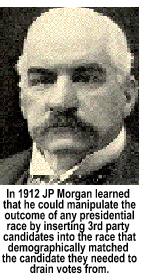 Morgan's
political advisers figured that the only person who could beat
Taft was Teddy Roosevelt. What they didn't know
was whether Roosevelt would drain enough votes from Wilson
to unseat both of them and win a third term.
Morgan's
political advisers figured that the only person who could beat
Taft was Teddy Roosevelt. What they didn't know
was whether Roosevelt would drain enough votes from Wilson
to unseat both of them and win a third term.
All of the private polls taken by JP Morgan & Company suggested that if the stodgy New Jersey governor challenged Taft without a strong Republican third party candidate running as an independent, Taft would win reelection hands-down, 55% to 45%. While American politics has had third party candidates in every presidential race except eleven, the candidates who bucked impossible odds to unseat establishment candidates didn't have a prayer of winning simply because they weren't anointed to win. The election apparatus—the American political machine—is, and has been since 1912, controlled by a group of virtually invisible transnational industrialists, merchant princes and bankers, but who have enough economic and financial power to decide who will win the highest office in the land.
The emerging New World Order tested their combined power for the first time in the Election of 1912. The financial giants at the pinnacle of power had successfully remained invisible for 50 years but, in 1907 they triggered a bank panic in order to scare the American people sufficiently for the "cure" they had in store—a brand new central bank that would be owned by them. Pressure was applied on Congress to submit three constitutional amendments to the States for ratification. The 16th Amendment would authorize a federal tax on incomes. The 17th Amendment would remove the States from the equation of power at the federal level; and the 18th Amendment, that could not pass muster and died in Congress, would have removed America's monetary system from the gold standard. Taft was neutral on the three amendments, or rather, the two constitutional resolutions that actually made it to the States. But the money barons knew Taft would veto the central bank legislation that was planned once the 16th and 17th Amendments were ratified.
Thomas Woodrow Wilson was hand-picked by JP Morgan to become the 28th President because, during the Bank Panic of 1907, Wilson argued that the nation would be best served by turning control of the government over to JP Morgan and the Money Mafia. To get Wilson elected, Morgan agents convinced former president Teddy Roosevelt that he needed to run for reelection, as an independent, in 1912. Morgan bankrolled his campaign. Morgan also privately bankrolled Wilson's campaign—as he publicly endorsed Taft for reelection and openly contributed to his campaign as well. Wilson, who was in the privately in the pocket of the bankers—and who had already privately agreed to sign into law a bill creating a new central bank when Congress passed it—accused Taft of being in the hip pocket of the money barons.
When
the dust settled after the election of 1912, Taft, who
would have received 55% of the vote in a two-man race, split the
Republican ballots with Roosevelt who took 27.4% of the
popular vote to Taft's 23.2%. Wilson took 41.9%
of the vote. Taft, who should have easily been reelected,
won two States—Utah and Vermont—and 8 electoral votes.
Roosevelt took six States and 88 electoral votes and stole
the election from Taft—but not for himself. 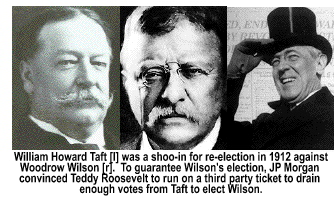 Wilson,
who would have come in second in a two-man race took 435 electoral
votes and became the 28th President of the United States. In
1912 the Money Mafia learned they could select and elect anyone
they wanted to the White House. The secret to controlling
the path to the presidency was in picking the spoilers who would
drain the votes from the candidate they did not want to win. In
the Election of 1916, Supreme Court Chief Justice Charles Evans
Hughes resigned his bench to run against Wilson. Hughes
was convinced Wilson planned to take America to war shortly
after the election. Morgan's lieutenants tried to get Roosevelt
to enter the race again. Roosevelt refused. Now a party
without a head, the Progressive Party fielded Congressional
candidates in 1916 but no presidential candidate. Party loyalists
voted for the House and Senate candidates and, while some Progressive
Party voters took their lead from the Old Bullmoose
and voted for Hughes, far too many abstained from voting
for the top of the ticket believing that one institutionalized
candidate was as bad as the next one, and Wilson was reelected.
Wilson reactivated Lincoln's draft began conscripting America's
youngbloods to send to Europe to find the Money Mafia's war to
dissolve national borders and create the League of Nations.
The American doughboy went to France and Belgium to shed their
blood so the visionaries of Utopia could create world government.
Wilson,
who would have come in second in a two-man race took 435 electoral
votes and became the 28th President of the United States. In
1912 the Money Mafia learned they could select and elect anyone
they wanted to the White House. The secret to controlling
the path to the presidency was in picking the spoilers who would
drain the votes from the candidate they did not want to win. In
the Election of 1916, Supreme Court Chief Justice Charles Evans
Hughes resigned his bench to run against Wilson. Hughes
was convinced Wilson planned to take America to war shortly
after the election. Morgan's lieutenants tried to get Roosevelt
to enter the race again. Roosevelt refused. Now a party
without a head, the Progressive Party fielded Congressional
candidates in 1916 but no presidential candidate. Party loyalists
voted for the House and Senate candidates and, while some Progressive
Party voters took their lead from the Old Bullmoose
and voted for Hughes, far too many abstained from voting
for the top of the ticket believing that one institutionalized
candidate was as bad as the next one, and Wilson was reelected.
Wilson reactivated Lincoln's draft began conscripting America's
youngbloods to send to Europe to find the Money Mafia's war to
dissolve national borders and create the League of Nations.
The American doughboy went to France and Belgium to shed their
blood so the visionaries of Utopia could create world government.
Spoilers were used in every election since 1912 to give an edge to the candidate backed by the transnational princes of industry and the barons of banking whenever the private polls suggested the horse they were backing in the main event might lose. In 1948 the money barons wanted globalist Harry S. Truman elected to a full term. With Truman's rapidly sinking popularity, all of the private polls said Republican New York Gov. Thomas Dewey was going to win in a close 52% to 48% election.
To pull the conservative Democratic blue collar union vote away from the GOP to guarantee the reelection of Truman, South Carolina Gov. Strom Thurmond split with Truman over civil rights issues and formed the States Rights Party, also known as the Dixiecrats. While it appeared to America's newspaper's audience that Thurmond would pull votes from Truman. In reality, the votes the Dixiecrats pulled were the Southern blue collar union conservatives who generally voted Republican. Thurmond pulled 1,275,930 votes and took 29 electoral votes. He pulled the election from Dewey and elected Truman. The visionaries of Utopia needed Truman to have a second term. Thurmond, who later became a Republican, gave it to him.
The next close race would be 1960. The oddsmakers were betting on Vice President Richard M. Nixon although the Utopians in the media wanted Camelot. The polls said the blue collar union workers in the South would cast their votes for Nixon. Once again the money barons called on the Dixiecrats. The standard bearer for the Dixiecrats this time around would be Sen. Harry Byrd [D-VA]. Byrd took 15 electoral votes in the South. Liberal Democrats claimed that Byrd stole votes that would have expanded Kennedy's lead over Nixon. In reality, the votes Byrd took would have given the 1960 election to Nixon. Only one Democratic President since 1920 has carried the Deep South, and that was Jimmy Carter in 1976. Kennedy lost Mississippi, Alabama and Florida.
Third party spoilers: Teddy Roosevelt in 1912, Strom Thurmond in 1948 and Harry Byrd in 1960 were hand-picked by the princes of industry and barons of banking to change the predicted outcome of those national elections. Each succeeded. In 1992 and 1996, Ross Perot was hand-picked to help a man who could not otherwise be elected win the White House.
Manipulating elections with third party spoilers
When he sought the GOP nomination for president
in 1996, news journalist and American Conservative Magazine
founder Patrick J. Buchanan discovered that the nominees
are actually picked before the primary campaigns ever begin. Primaries,
like general elections, are simply "show piece"events
designed to make the working class—who still think they pick
the candidates who will get nominated—and that, by chance,
they elect the nominee who wins. The outcome of every presidential
election is predetermined as best it can be before the first vote
is ever cast. 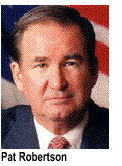 Long
before the votes are cast, political strategists have put every
combination of candidates together to gauge how they will fare
in the voting booths—and whether the "anointed"
candidate will need third party support to achieve victory.
Long
before the votes are cast, political strategists have put every
combination of candidates together to gauge how they will fare
in the voting booths—and whether the "anointed"
candidate will need third party support to achieve victory.
That doesn't mean the anointed loser will simply sit back and let the gold ring slip through his grasp without trying to win the prize—although that's what President George H.W. Bush did in 1992. The Money Mafia backed Clinton that year because they needed a Democrat to to push NAFTA through the Democratically-controlled Congress. Senator Bob Dole allowed himself to be the sacrificial GOP water boy in 1996. Neither candidate—Bush-41 in 1992 nor Dole in 1996—ran hard enough to work up a good sweat. In 2000, the anointed loser was Al Gore, Jr. The Dole-role he was appointed to play in 2000 was not lost of Gore. He simply repudiated the idea of losing since, in his mind, he had a date with destiny—he was destined to be the leader of the free world.
The barons of finance and industry placed their chits on George W. Bush that year. What that meant was that the only third party candidate who could expect any meaningful play in the media after Pat Buchanan's successful coup of the Reform Party was Green Party candidate Ralph Nader, since the media-anointed third party candidate had to drain votes from Gore, not Bush. None of this was lost on Gore who had no intention of walking away from the Oval Office when he was only one heartbeat from it as Vice President. That also meant that Buchanan needed the same type of media coverage given to Perot in 1992 and 1996. However, from the moment Buchanan won the Reform Party nomination—he became the invisible man. That was not lost on Gore, either.
For
Gore to win in 2000, Pat Buchanan had to be the
unchallenged winner of the Reform Party nomination. He
wasn't. When the Reform Party met in Long Beach, California on
Aug. 11, 2000 to officially count the ballots cast by Reform
Party loyalists, Buchanan won a clear victory—49,529
votes against Hagelin's 28,539. (About 10,000 fewer votes
than Perot received in 1996.) The Hagelinites claimed that
over 40,000 of Buchanan's votes came from Buchanan's
conservative supporters, not Reform Party voters. Because
they were not people who voted for Perot in 1996, Hagelin
insisted they were fraudulent votes. 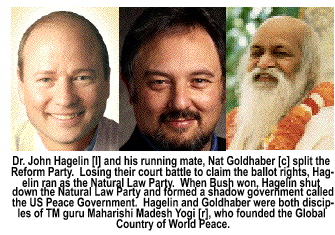 Hagelin
claimed victory and tried to rewrite the rules for seating delegates.
When he lost, the liberals and greens walked out, went down the
street to another convention center and formed the Reform Party,
USA. The rump party nominated Hagelin for president
and Nat Goldhaber as his running mate. Both Hagelin
and Goldhaber are ranking disciples of Transcendental Meditation
founder Marharishi Mahesh Yogi. With $12.6 million in matching
funds at stake, the Hagelin forces sued. The Federal
Election Commission found that Buchanan legally won
the Reform Party nomination and was entitled not only to
the matching funds but the Party's name on the ballot.
Hagelin
claimed victory and tried to rewrite the rules for seating delegates.
When he lost, the liberals and greens walked out, went down the
street to another convention center and formed the Reform Party,
USA. The rump party nominated Hagelin for president
and Nat Goldhaber as his running mate. Both Hagelin
and Goldhaber are ranking disciples of Transcendental Meditation
founder Marharishi Mahesh Yogi. With $12.6 million in matching
funds at stake, the Hagelin forces sued. The Federal
Election Commission found that Buchanan legally won
the Reform Party nomination and was entitled not only to
the matching funds but the Party's name on the ballot.
Buchanan left the Republican Party in the summer of 1999 because he discovered that the two-party system was rigged to favor the candidates of choice of the barons of industry and finance. Buchanan, however, failed to grasp the reality that even third party candidates—if they expect to receive any meaningful media play—had to receive the same type of anointing since they serve a similar role in the electoral process. Their function is to drain votes from one of the primary party nominees to assure the election of the other. In a close election, their role is critical. Since the merchant princes of industry and the barons of finance placed their chits on George W. Bush in 2000 and not Gore, the only third party candidate who could therefore expect any meaningful play in the media after Buchanan's successful coup of the Reform Party was Green Party candidate Ralph Nader, since the media-anointed third party candidate had to drain votes from Gore, not Bush. This was not lost on Gore, either. Had Buchanan received as much media attention as Nader, Al Gore, Jr. would have become the 43rd President of the United States—without the need for the rampant vote fraud that has become a major part of every Democratic campaign since 1960 because the leftward drifting liberal Democratic Party no longer represents the traditional values of America.
Bush lost Wisconsin by 6,099 votes. Buchanan took 11,256 votes in Wisconsin—more than enough, in a two-man race, to deliver Wisconsin's 11 electoral votes to Bush. Instead, Buchanan gave Wisconsin to Gore. Bush lost Iowa by 4,949 votes. Buchanan took 22,256 votes and gave Iowa's 7 electoral votes to Gore. Gore won Oregon by 2,192 votes—or approximately 1/3rd of 1% of the total votes cast (yet there was no mandatory recount as required by State law because Bush did not push the issue.) Buchanan delivered Oregon's 7 electoral votes to Gore by taking 6,522 votes. Had Buchanan not been a factor in those States, Bush would have gained 25 electoral votes and even without Florida, would have won the election with 271 votes. Only, the election would have been over on November 7. With Florida, Bush would have won 296 electoral votes. Buchanan took only 4/10th of 1% of the national vote and failed to qualify for matching funds in 2004 (which requires 5% of the vote) when Ralph Nader became the Reform Party's candidate. Nader's Green Party garnered 2.7% of the vote in 2000. In 2004, when he was the Reform Party nominee, Nader took 4/10ths of 1% of the vote nationwide.
The new spoilers...there is no unity in Unity
As Hillary Clinton prepares for her unconstitutional run for the roses in 2008, she is facing three major hurdles. First, she has to secure a nomination that Article 2, Section 1 of the Constitution of the United States reserves exclusively for a man. Second, she has to overcome a well-deserved hostility that the American people feel towards her—providing no groups or organizations challenge her constitutional right to run—in order to secure that nomination. And, third, while she has already amassed a war chest of sufficient size to overwhelm any Democratic challengers and secure the nomination (if her candidacy is not challenged in the Supreme Court), she has to secure a plurality of the vote sufficient to give her 538 electoral votes. And, that will prove to be the hardest task since her husband could not get over 50% of the vote in either of his elections. In 1992, Bill Clinton took 42.9% of the vote. In 1996, he took 49.2% of the vote. In neither election could it be said that Clinton had a "mandate to rule."
Without
a lot of help from the media that is trying hard to depict her
as a traditional values American and a pro-defense moderate, Hillary
Clinton can count on the votes of approximately 28% of the
voters—the extreme left that is currently attacking her made-for-TV
pro-military position. And that is precisely who is behind the
new third party movement, Unity08—a group of ultra
liberal Washington-insiders who claim they want to use the Internet
to remake American politics by creating a bipartisan presidential
ticket in 2008. 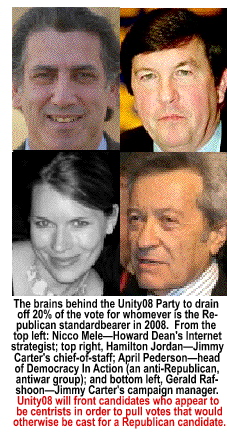 Clintonesque
smoke and mirrors with a touch of Jimmy Carter. The political
minds behind Unity08 are former president Jimmy Carter's
Chief-of-Staff Hamilton Jordan; Gerald Rafshoon,
Carter's campaign manager; Nicco Mele, Howard
Dean's Internet strategist and the webmaster of Dean2004;
and a far-left antiwar group, Democracy In Action.org headed
by a Code Pink-Cindy Sheehan antiwar activist and
ecoalarmist environmentalist, April Pedersen.
Clintonesque
smoke and mirrors with a touch of Jimmy Carter. The political
minds behind Unity08 are former president Jimmy Carter's
Chief-of-Staff Hamilton Jordan; Gerald Rafshoon,
Carter's campaign manager; Nicco Mele, Howard
Dean's Internet strategist and the webmaster of Dean2004;
and a far-left antiwar group, Democracy In Action.org headed
by a Code Pink-Cindy Sheehan antiwar activist and
ecoalarmist environmentalist, April Pedersen.
Democracy In Action.com and .org has close ties to the Green Party which initiated an effort to impeach George W. Bush and Dick Cheney over Bush's decision to launch the invasion of Iraq on "deceptive evidence." Democracy In Action is an ultraliberal groups that portrays American soldiers as killers and dead insurgents as victims. When Pedersen and her Operations Director, Chris Lundberg joined the Unity08 effort, they decided to clean up their website so that traditional values voters who are disillusioned with the two mainstream parties could not discern their far left credentials from their two websites: DemocracyInAction.org and DemocracyInAction.com.
On April 23, 2006 Democracy In Action,org shut down their website for housecleaning and "data realignment," that appears to have erased or concealed some of their links to radical far left groups. In addition, adding Democracy In Action.com to accommodate the disillusioned, curious conservatives who are angry at the policies of George Bush. The details of the housecleaning appeared on http://www.democracyinaction.org/www/status/atom.xml
Unity08 has done the same thing. Shilling for Unity08 in order to give it a media appearance of bipartisanism—just as the Reform Party did in 1992, 1996 and 2000—are a handful of left-leaning Republicans and independents who are being positioned by the media as traditional value centrists who are the core in what is being touted as a truly bipartisan political party that is being created to restore constitutional balance to the political process. Unity08 claims it will offer presidential and vice presidential candidates from opposite sides of the aisle—or independents who are not tied to either—to combat the polarization of the mainstream political parties. Unity08's propagandists claim what will make the new party different is that it does not come with a presidential and vice presidential candidate attached. Unity08
One
of the high profile figures is Jim Jonas. Jonas
was a former Lamar Alexander [R-TN] speech writer and propagandist
for Bush-Quayle during Bush-41's failed campaign
against Bill Clinton. In addition, Jonas has been
the publicist for numerous candidates for the US Senate and the
House of Representatives. A Republican operative in the past,
Jonas' is one of the closet liberals chosen to give the
new party the facial uplift it needs to make the American people
believe that a true coalition political party was being formed.
Also shilling for Unity08 is former Independent Party Maine
Gov. Angus King. King, a true political moderate,
will likely be on the Unity ticket since the former Maine PBS
TV-host was reelected as governor in 1998 with 59% of the vote
against Republican Jim Longley, Jr. who received 19% and
Democrat Thomas Connolly, who took 12% of the vote. Also
promoted as a traditional values Republican is former US Ambassador
to Guatemala Thomas F. Stroock. Stroock was appointed
by Bush-41 in 1989. 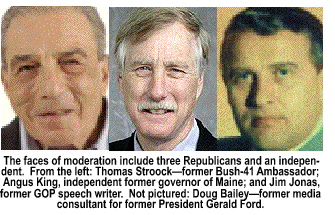 Stroock,
a liberal environmentalist, is a trustee of The Nature Conservancy.
Also part of the Unity08 shill group is Doug Bailey. Bailey
was a media consultant for former president Gerald Ford,
and GOP senators Richard Lugar and Lamar Alexander.
Bailey co-founder the Internet inside-the-beltway political
newsletter, The Hotline—which is neither Republican
nor bipartisan.
Stroock,
a liberal environmentalist, is a trustee of The Nature Conservancy.
Also part of the Unity08 shill group is Doug Bailey. Bailey
was a media consultant for former president Gerald Ford,
and GOP senators Richard Lugar and Lamar Alexander.
Bailey co-founder the Internet inside-the-beltway political
newsletter, The Hotline—which is neither Republican
nor bipartisan.
The stated "goal" of the Unity08 Party is to create what party organizers will claim is a bipartisan ticket for president and vice president headed by a woman and/or man from each major party, or an Independent like Angus King. Unity's theoretic secondary goal—which simply can't happen—is for the people themselves to select the Unity ticket. That won't happen simply because the Unity08 Party is being created as a spoiler party to assure that whomever heads the Democratic ticket in 2008 will be elected president. All of the bipartisan rhetoric aside, Unity08 is being created by the far left to help the antiwar liberals regain control of both Houses of Congress and the White House.
Working class supporters of the "bipartisan concept" will be flimflammed into believing the smoke and mirrors rhetoric that their online votes will determine the standard-bearer of the new party. In reality, Unity08's nominees will be hand-picked by the utopian flim flam artists working for the same political power barons who give the nod on the GOP and Democratic candidates. Unity08's candidates will be selected for one purpose only—to pull 20% of the popular vote away from the Republican presidential candidate and elect the Democrat, whom the Unity08 backers believe will be Hillary Clinton.
Unity08's organizers who claim to the suckers who buy their bipartisan song and dance rhetoric that they will win the Election of 2008, estimate they will pull 20% of the vote—2% more than Ross Perot in 1992. If we do it, party organizers fervently declare, "...our voters will decide the 2008 election." Unity08's goal is not to win—it's to make sure the Republican Party doesn't win. Privately, the party's organizers say they don't want to create a third party, rather, they want to force both major parties to revamp themselves and become more issue-oriented. "What we are trying to do," Doug Bailey said, "is create a forum for people who are in the middle who have been left out of politics."
Hillary Clinton knew that in 1992. The working class moderates in the middle—most of whom are registered Democrats—will vote Republican anytime a liberal head the Democratic ticket. They represent 20% of the voters. They are the swing voters who decide elections. They are the genuine independents because even though the unions they belong to push them to vote straight ticket, they seldom do. They elected Ronald Reagan in 1980 and 1984. They elected George H.W. Bush in 1988 and they elected George W. Bush in 2000 and 2004. In 1992 and 1996 they were flimflammed into voting for Ross Perot, believing the pint-sized Texan in the ten gallon hat was actually trying to win an election. He was—but not for himself. Nor for the people who wasted their vote on the Reform Party. Pint-sized Perot was a kingsized flim-flammer. He signed on to win the the Election of 1992 for Bill and Hillary Clinton for the lion's share of the Hillary Clinton Health Security Act IT business—estimated at $85 billion. The swing voters who thought they were electing Ross Perot elected the co-presidency of Bill and Hillary Clinton.
The political blogshere that will shape the 2008 debate is dominated by the radical ideology of the past. Hamilton Jordan. Gerald Rafshoon. Behind them are the new voices of the antiwar left. April Pedersen. Catherine Dunham. Medea Benjamin. Andrea Buffa. Their role in the political process is not to win elections since the radical left is a minority. But they are masters of the flim flam. Their job is not to elect their candidate. Their job, this time around, is to get 20% of the American voters to vote for their candidate in order to elect Hillary Rodham Clinton as the 44th President of the United States.

Copyright © 2009 Jon Christian Ryter.
All rights reserved.


